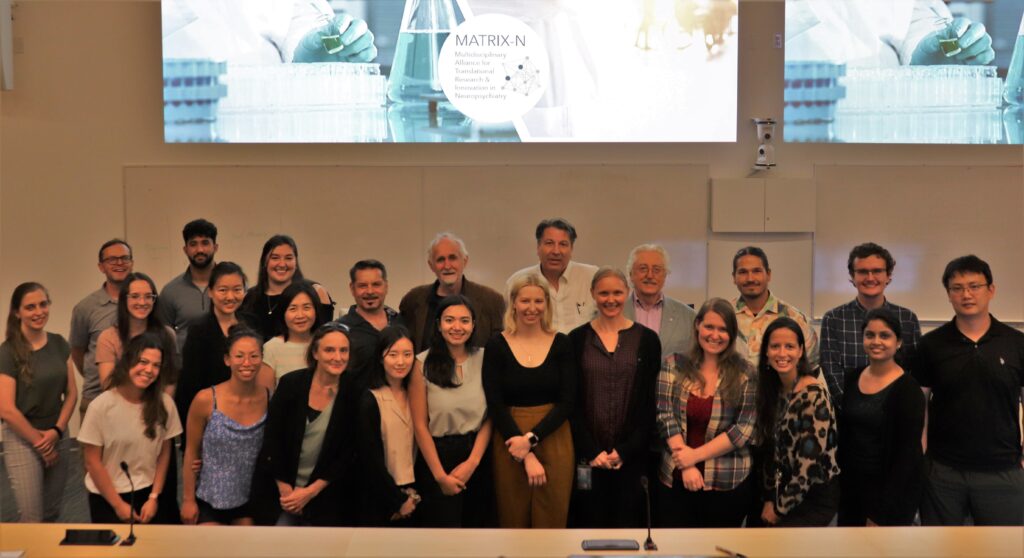It is estimated that one in five Canadians experiences a mental illness in any given year. Recently, this has been exacerbated by the opioid overdose crisis, particularly in British Columbia where nearly 1500 lives were lost to illicit drugs in the first eight months of 2022 alone, as well as the COVID-19 pandemic with its far-reaching negative effects on mental health and access to care.
These growing health and socioeconomic issues highlight the urgent unmet clinical need for innovative solutions and new, more effective treatments to improve patient outcomes. Two promising research strategies to address this gap are the integration of foundational and clinical research, and concept of ‘reverse translation’, which prioritizes insights from clinicians and front-line health workers in inspiring translational research with potential for immediate and significant clinical impact.
The Multidisciplinary Alliance for Translational Research and Innovation in Neuropsychiatry (MATRIX-N) seeks to bridge gaps between research, clinical practice and patient needs to facilitate innovative solutions to local and global mental health challenges. This new UBC-funded research excellence cluster is led by Dr. Anthony Phillips (researcher at the Djavad Mowafaghian Centre for Brain Health (DMCBH) and professor in UBC’s Department of Psychiatry), with Dr. Michael Krausz (professor and director of UBC’s Addiction Psychiatry Program) and Dr. Tamara Vanderwal (UBC Psychiatry assistant professor and DMCBH member) as cluster faculty co-leads, and Dr. Lily Aleksandrova (UBC Psychiatry/DMCBH postdoctoral fellow) as cluster coordinator. Six UBC graduate students of various research backgrounds have also been recruited as part of the MATRIX-N Junior Scholars Program to support the cluster’s activities.
MATRIX-N brings together a diverse group of researchers from various departments and disciplines (over 70 faculty and trainee members to date), each committed to a reverse-translation strategy. The main focus of the cluster is to create new multidisciplinary collaborations between foundational and clinical researchers, in order to increase the translational power of neuropsychiatry research into novel treatments and ensure more cost-effective and clinically-relevant drug development processes.

Members of MATRIX-N at the cluster’s launch event.
“MATRIX-N has accepted the challenge of transforming ‘translation research’ from an aspirational concept into a strategy for action,” says Dr. Phillips. “Drawing inspiration from unique clinical insights, coupled with the mastery of foundational neurosciences, cognitive sciences, neuropharmacology, computer science, biophysics, medicinal chemistry, immunology, and human brain-imaging, MATRIX-N interdisciplinary collaborations will lead to novel therapeutic approaches for neuropsychiatric, neurodegenerative and substance use disorders.”
The cluster provides opportunities for continuous, meaningful dialogue between preclinical and clinical researchers to foster high-impact research partnerships, as well as among target audiences to identify patient needs, challenges and lived experiences. Towards these goals, in its first year, MATRIX-N will establish a knowledge exchange plan, public seminar series, as well as Community and International Advisory Groups.
“We are committed to designing targeted community outreach initiatives that consult with and educate affected communities,” says Dr. Krausz. “By working with and engaging patients, clinicians, and health care practitioners while expanding the capacity for translational research at UBC and beyond, we hope to provide an integrated, expedited, evidence-based response to the current public health emergencies of mental ill-health, substance use disorders, and opioid overdoses.”
The MATRIX-N cluster is organizing an innovative, virtual conference titled ‘Translation in Action: From Neuropsychiatry Research to Health Solutions’. This free, all-day event takes place on December 6, 2022 and will bring together over 1000 researchers, clinicians and community members to discuss success stories and challenges in translational research, new treatments for substance use disorders and pain, and advances in psychedelic research. Free registration is now open, with many opportunities to present your work, get involved, or share your unique perspectives and lived experiences!


